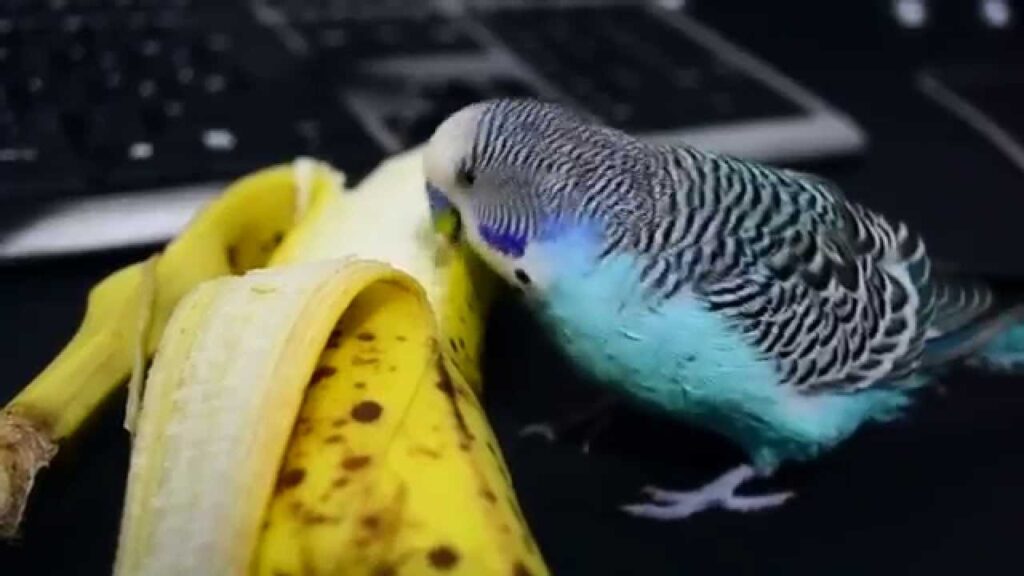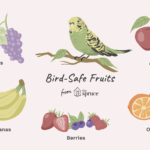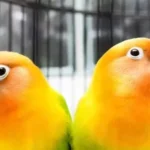Yes, lovebirds can eat bananas. This fruit offers a nutritious snack for them.
Lovebirds, parrots known for their lively and affectionate nature, require a varied diet to maintain optimal health. Bananas, rich in potassium and essential vitamins, provide a sweet treat that can enhance your pet lovebird’s dietary variety. As with any addition to a lovebird’s diet, it’s important to introduce bananas in moderation.
Fresh fruits like bananas should be washed thoroughly to remove any pesticides and served without the peel to avoid potential toxins. Integrating a small amount of mashed or sliced banana into their feeding routine can add both flavor and nutritional benefits, ensuring your lovebird enjoys a well-balanced and delicious diet. Always provide clean water and monitor your lovebird’s response to new foods like bananas to ensure they’re eating well and thriving.
Introduction To Lovebirds And Their Diet
Welcome to the whimsical world of lovebirds, a delight to bird enthusiasts everywhere! These small, colorful parrots bring joy with their playful antics and sweet demeanor. Understanding what lovebirds eat is crucial for their care. Let’s take a closer look at their natural diet and nutritional needs.
The Natural Diet Of Lovebirds
Lovebirds hail from African environments where their diet is quite diverse. Out in the wild, these birds enjoy a mix of food resources.
- Fruits: Discover a range of sweet treats in their diet.
- Seeds: Grasses and plants provide these essentials.
- Vegetables: Leafy greens and others for balanced nutrition.
Nutritional Needs For Avian Health
Proper nutrition is key for keeping lovebirds healthy. Their bodies require a balance of vitamins, minerals, and other nutrients to thrive.
| Nutrient | Benefits |
|---|---|
| Vitamin A | Essential for vision and growth. |
| Calcium | Supports bone structure and function. |
| Proteins | Critical for muscle and feather health. |
Bananas As A Bird Treat
Lovebirds enjoy a variety of foods, and bananas can be a delightful treat. These soft, sweet fruits are easy for birds to eat. They offer essential nutrients beneficial to your feathered friend’s health. But it’s important to understand the right way to incorporate bananas into their diet.
Benefits Of Bananas In A Bird’s Diet
Bananas are packed with important vitamins and minerals. These include vitamin C, potassium, and dietary fiber. They aid in maintaining health, supporting the immune system, and promoting digestive health. Here’s how bananas can benefit your lovebird:
- Vitamin C boosts the immune system.
- Potassium helps muscle and nerve function.
- Fiber aids in digestion.
- Low in sodium and cholesterol, making them heart-healthy.
How Often Should Lovebirds Eat Bananas
While bananas are a safe treat, they should be given in moderation. Think of bananas as a special snack for your lovebird, not a daily dietary staple. Serve them:
| Frequency | Amount |
|---|---|
| 1-2 times per week | A few small pieces |
Remove any uneaten banana within a couple of hours. This prevents the fruit from spoiling in their cage.
Preparing Bananas For Your Lovebirds
Preparing Bananas for Your Lovebirds is essential for ensuring they get a tasty and healthy treat. Bananas are packed with nutrients and are quite beneficial for lovebirds. But, it’s important to know the right way to serve them. This way, your feathered friends can enjoy their snack safely!
Safe Ways To Serve Bananas
Lovebirds can safely enjoy bananas by following these steps:
- Choose ripe bananas: The skin should be yellow and slightly soft.
- Wash thoroughly: Clean the skin to remove any pesticides or contaminants.
- Peel the banana: Lovebirds usually enjoy the fruit without the skin.
- Slice into small pieces: This makes it easier for lovebirds to eat.
- Remove seeds: Although banana seeds are small, it’s best to remove them.
- Offer in moderation: Like all treats, bananas should be given sparingly.
Foods To Avoid Mixing With Bananas
Certain foods should not be mixed with bananas when serving to lovebirds:
| Food Type | Reason to Avoid |
|---|---|
| Avocado | Toxic to birds, can cause health issues |
| Chocolate | Contains theobromine, harmful to lovebirds |
| Caffeine | Stimulates the heart, dangerous for birds |
| Alcohol | Poisons lovebirds, even in small amounts |
| Fruit pits and seeds | Some contain cyanide, harmful to birds |
Always research before introducing new foods to your lovebird’s diet. Offer a variety of fruits, vegetables, and seeds for a balanced diet.
Potential Risks Of Feeding Bananas To Lovebirds
Potential Risks of Feeding Bananas to Lovebirds may not be common knowledge. Bananas are tasty and nutritious for humans, but lovebirds can face some issues. This fruit could have hidden dangers. Knowing these risks helps keep your feathered friends safe and healthy.
Sugar Content In Bananas
Bananas have a high sugar content. This fact is crucial for lovebird owners. Birds love sweet foods, but too much sugar is harmful. Overeating sugary fruits like bananas can lead to:
- Obesity in birds
- Diabetes, a rare but possible risk
Always serve bananas in moderation. Couple them with a balanced diet.
Concerns Over Pesticides And Toxins
Lovebirds are sensitive to pesticides and toxins. These substances often linger on the skin of bananas. Even small amounts can be dangerous. Birds cannot remove these toxins as people do.
| Toxin Type | Effect on Lovebirds |
|---|---|
| Pesticides | Health issues, potentially fatal |
| Other Chemicals | Could cause illness or distress |
To minimize risks, choose organic bananas. Always wash them well before serving.
Understanding these risks ensures lovebirds enjoy bananas without harm. Serve fruits properly and keep your birds thriving.
Ideal Fruits For Lovebirds
When it comes to feeding lovebirds, picking the right fruits is crucial. These vibrant birds need a variety of vitamins and nutrients to stay healthy. Giving your feathered friends the best fruits can add both joy and nutrition to their daily diet. Let’s dive into what fruits serve as the perfect treat for lovebirds.
Best Fruits To Offer
Besides bananas, many fruits are lovebirds’ favorites. Safe and healthy options include:
- Apples (remove seeds)
- Pears
- Berries such as strawberries, blueberries, and raspberries
- Melon of all kinds
- Grapes (in moderation)
These fruits offer a range of flavors and benefits that lovebirds appreciate. It’s important to wash all fruits thoroughly and remove any pits or seeds that could be harmful.
Creating A Balanced Fruit Mix
Integrating fruits into your lovebird’s diet can be fun and nutritious. A balanced mix should include:
- Various fruits for a range of vitamins
- Fruits cut into small, manageable pieces
- An option to mix with vegetables for added benefits
Keep the fruit servings small to avoid overfeeding. Balance these sweet snacks with their main diet of pellets or seeds. Even the best fruits are only part of what they need.
| Fruit | Frequency | Benefits |
|---|---|---|
| Bananas | Occasionally | Potassium and Fiber |
| Apples | Regularly | Vitamins A and C |
| Berries | Occasionally | Antioxidants |
| Grapes | Sparingly | Vitamin K and C |
Remember, always provide fresh water alongside the fruit mix to help your lovebirds stay hydrated.

Credit: m.youtube.com
Monitoring Your Lovebird’s Health
Keeping your lovebird healthy involves more than just offering them tasty bananas. Observing their daily behavior and diet contributes to their overall well-being. Understanding what constitutes a balanced diet and recognizing when to seek professional advice are crucial steps in nurturing a happy, healthy feathered friend.
Signs Of A Balanced Diet
A lovebird with a balanced diet displays specific signs you should look for:
- Vibrant feathers: Indicates good nutrition.
- Active behavior: A lively bird is a healthy bird.
- Regular droppings: Consistent and solid waste suggests good digestion.
The inclusion of bananas, rich in vitamins and fiber, can be a tasty addition to a diet that already consists of a variety of seeds, vegetables, and pellets.
When To Consult An Avian Veterinarian
While feeding your lovebird bananas is generally safe, certain signs warrant a visit to an avian veterinarian.
| Symptom | Possible Cause | Action |
|---|---|---|
| Lethargy | Diet imbalance or illness | Consult veterinarian immediately |
| Feather plucking | Nutritional deficiency | Review diet; seek advice |
| Change in droppings | Digestive issues | Monitor diet; visit vet if persistent |
Always remember, a sudden change in diet can create stress for your lovebird. Gradual introduction of new foods like bananas is key. Your avian vet remains the best resource for personalized dietary advice and health assessments.
Incorporating Bananas Into Bird Training
Lovebirds brighten our homes with their vibrant feathers and spirited personalities. Just like humans, these little parrots enjoy a variety of foods, with bananas being a delightful treat. Bananas are not only tasty but also packed with essential nutrients, making them a great snack for your feathered friends. Let’s explore how we can effectively use bananas in bird training sessions.
Using Banana Slices As Positive Reinforcement
Positive reinforcement is a powerful tool in bird training. Small banana slices can act as the perfect reward. When lovebirds successfully follow a command or learn a new trick, offering a banana slice can reinforce this behavior. Consistency is key in building a bond and nurturing their learning process.
- Peel the banana and cut it into small, manageable pieces.
- Offer slices right after a successful trick or command.
- Observe your bird as it enjoys the treat, ensuring safety.
Limits To Treat-based Training
While bananas are a healthful snack, it’s important to recognize that balance is essential. Over-reliance on treats can lead to nutritional imbalances and weight gain. It’s crucial to limit treats to about 10% of your lovebird’s daily diet.
| Treat Frequency | Portion Size |
|---|---|
| Occasional | 1 small slice |
| Daily Training | 2-3 tiny pieces |
Remember to include a variety of foods in their diet to ensure overall health and happiness. Monitor your lovebird’s response to different treats and adjust the training methods as needed.
:strip_icc()/safe-fruits-for-birds-390622_Final-5bbd0d6ec9e77c0051dd8f07.png)
Credit: www.thesprucepets.com
Lovebird Owners’ Experiences
Many lovebird owners love sharing stories about their feathered friends. A hot topic among them is the feeding of bananas. Some see this fruit as a sweet treat, but others advise caution. Let’s dive into their experiences.
Success Stories Of Bananas In Diets
Bananas can be a hit with lovebirds.
- Rich in nutrients, bananas offer vitamins and minerals.
- Owners report improved feather health and energy.
- Some lovebirds can’t get enough of this tasty snack!
| Banana Quantity | Lovebird Reaction |
|---|---|
| Small piece | Happy and content |
| Half a banana | Too much, might ignore other foods |
These stories show bananas can fit into a lovebird’s diet when given properly.
Warnings And Precautionary Tales
Yet, feeding bananas calls for a watchful eye. Here are some words of caution:
- Avoid overfeeding to prevent obesity.
- Never feed chocolate-covered bananas; chocolate is toxic to birds.
- Organic bananas are better for avoiding pesticides.

Credit: parrotjunkie.com
Conclusion
To wrap it up, lovebirds can safely nibble on bananas as part of a diverse diet. Just remember to serve them in moderation and without the peel. By doing so, you’re ensuring your feathered friends enjoy a tasty, nutritious treat that supports their vibrant health.
Share the joy of your lovebird’s mealtime with this delightful fruit!
Ryan Everhart is a passionate bird enthusiast and blogger, primarily writing on his website, Avian Whispers. His journey into the world of bird blogging began with a deep interest in parrots, a species that captivated his attention for their intelligence and social behavior. Over time, his content expanded to cover a broader range of bird species, offering insights into bird behavior, care, habitats, and conservation.
Ryan is dedicated to educating his audience, which includes both new bird owners and seasoned enthusiasts. His writing is filled with personal experiences, expert knowledge, and practical advice on bird care. Through Avian Whispers, he aims to foster a deeper appreciation for birds, emphasizing their role in nature and the joys of having them as pets.
Starting with articles focused on parrots, Ryan’s work now encompasses a diverse range of topics such as feeding, training, habitat enrichment, and bird health. His love for birds extends beyond parrots, diving into various avian species. His informative and heartfelt writing reflects his commitment to the well-being of birds and the desire to help others connect with these creatures.
As a growing voice in the bird blogging community, Ryan strives to provide a platform where bird lovers can learn, share experiences, and connect over a shared passion for avian life. His blogs are not only educational but also serve as a reminder of the importance of protecting and nurturing the bond between humans and birds.




